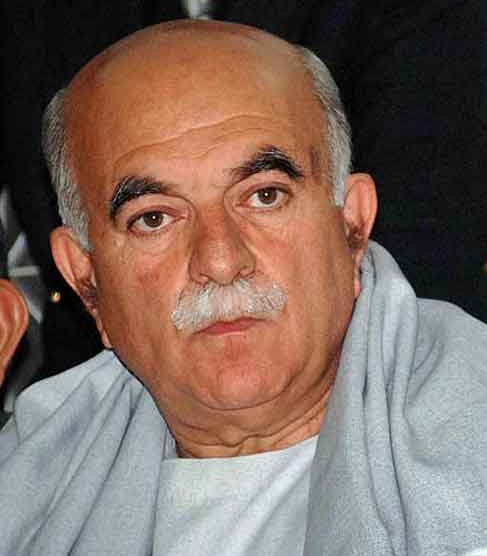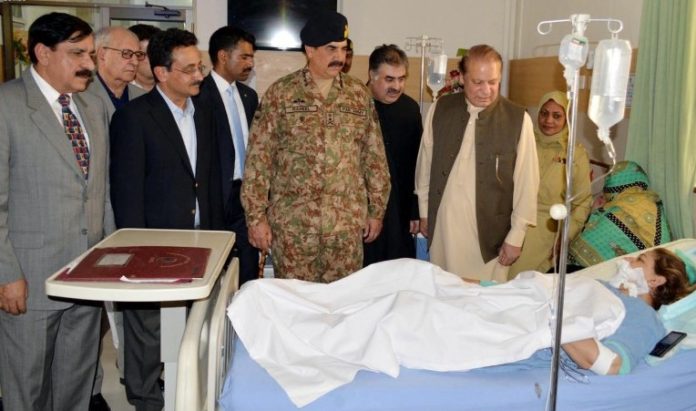Three consecutive days of deliberations and the result was abysmal creation of another High Level Task Force to monitor the progress on implementation of the National Action Plan (NAP). This additional Task Force will comprise of senior representatives of all concerned departments and agencies of the Federal Government and the Provinces—another bickering forum.
The Government may take solace behind the arguments that large-scale attacks, like the one at Quetta Hospital were manifestation of reaction by the militants after the state began to go after them; in reality it were such attacks that prompted actions like Zarb-e-Azb. Those responsible for countering terrorist attacks are in the habit of finding excuses for such terrorist attacks that invariably carry embedded praise for their earlier efforts. Something is certainly missing somewhere, that’s why we keep arguing in circuitous manner to cover the inadequacies of our counter terrorism effort.
However, such attacks disprove the tall claims by security forces and law-enforcement agencies that they have nailed-in terrorism through intelligence based operations. The real challenge of course is how the problem is to be solved; and, of course there are no easy and instant solutions. Though we have come a long way in reducing the frequency of such attacks, the finish line is still far away—warranting perseverance, professionalism and political acumen.
Balochistan has all along been a trouble prone province for one reason or the other. Equally ghastly incidents have been haunting its urban centers much before the entry of China Pakistan Economic Corridor (CPEC) factor. There are multiple powerful fault lines capable to igniting the tinderbox on the slightest pretext. Moreover, Quetta Hospital type incidents are not specific to Balochistan, such events are happening in all provinces and territories of Pakistan.
During his address to the National Assembly, the Prime Minister was right in stating that the mindset behind the Quetta attack was the same that had targeted Pakistanis in numerous earlier attacks. Pakistan today is more secure and stable compared with the yester years. He further said that Operation Zarb-e-Azb is a unanimous national agenda that will be completed at all costs. The Prime Minister gave a call for greater national unity, reemphasizing that his government was committed to eradicating terrorism. “The entire nation is united in the war on terrorism. We will not take rest till the elimination of terrorism from our homeland,” the PM said. He also sought to negate the perception of divisions among the country’s military and political leadership, saying they were on the same page. The PM praised the national security institutions, saying: “They were securing the borders and protecting the people from enemies and terrorists inside.”
The Prime Minister struggled his way through a prepared text; he appeared preoccupied elsewhere; his articulations were unimpressive, void of resolve. If the objective of PM’s speech was to instill confidence in the man in the street, it did exactly the opposite. Likewise, what was required from the opposition was not a walk out but a convincing contemplation and suggestions about the way forward.

Earlier Pakhtoon Khawa Milli Awami Party Chief Mahmood Achakzai had harshly questioned the performance of intelligence agencies and termed the Quetta attack as an intelligence failure. Achakzai demanded fixing the responsibility of the blast and asked the PM to sack officers if they fail to trace out elements involved in the deadly attack. Similar sentiments were aired by the JUI Chief, Maulana Fazl-ur-Rahman, though in a milder tone. Certainly there is merit in their argument. The Interior Minister said that while most political parties were against the introduction of harsh laws, stricter laws were needed to reign in terrorists. We have adequate laws, we are indeed an over legislated nation and where we lack is will and efficiency of Law Enforcing Agencies with regard to implementation.
Certainly, such security lapses are the fault of the security agencies, and too many such lapses have happened for us to continue giving them the benefit of doubt. Had any other government department failed at their job with such frequency and with such shattering consequences, heads would have rolled long ago. Beyond doubt, it is time for our intelligence agencies to be held accountable for such lapses, after all it is their duty to neutralize foreign intelligence agencies’ efforts before they materialize into such attacks. At the same time one must admit that implementation of the NAP has at best been half-hearted, lacking political will. Protection of Pakistan Act (PPA) has lapsed without timely follow-up for its continuation. Employees of National Counter Terrorism Authority (NACTA) have not been paid salaries for the last seven months, and so on and so forth.
While it would be naïve to believe that certain foreign forces would not take advantage of a crisis in the region to cause further instability, ascribing blame on RAW has become an easy scapegoat for the state failures—especially in Balochistan. Let’s not forget a similar incident took place in Punjab on Easter day. We shake up from slumber on every major blast, in terms of loss of human lives, post activity in great panic and fanfare for a few weeks and then go into a deeper slumber—or say coma. Again and again, same lessons are learnt—and forgotten. Comments and reactions by various segments of leadership indicate that we have not learned any lessons; so the unfortunate truth is that more such events are likely to happen in Pakistan.
The political leadership managed to compose a usual message of sorrow, deterrence and resolve, couched in strong phrases and staunch words. Unfortunately, their words rang hollow, the phrases had little impact such articulations had since been heard umpteenth times.
To stay viable, terrorist entities have to conduct one such attack in a while, followed by a long pause, so far they retain this capability. And, over and above, such entities are in sufficient number, so even if each carries out such activity once in a while, those at the receiving end are poised to face it quite often. At the same time, to stay credible, those responsible to counter such attacks must be able to intercept each potential attempt before it culminates in to a blast. Each blast is failure of those tasked to prevent it, that’s what professionalism dictates. There are many credible reports indicating that Balochistan is infested with agents of intelligence agencies from all over the world, not just India. The question is, who is responsible to deal with counter espionage? And why isn’t it being done in a professional manner? There is need to take stock as to why our counter intelligence is failing again and again and make appropriate course correction.
Security in form is sprinkled all over Pakistan however, it terribly lacks in substance. Security is on exhibition in shopping malls, airports, road barrier, etc. and the police, military and paramilitary personnel are everywhere alongside innumerable private security personnel. Those who carried out the Quetta attacks must have escaped detection from many such barriers or scans, the question is why and how?
The Supreme Court directed the provincial authorities on August 11 to evolve a mechanism for screening out private security guards. “There may be some agents of RAW or Taliban,” CJP Justice Anwar Zaheer Jamali observed. Referring to the recent killings of more than 70 citizens in Quetta, the top judge made eye-opening remarks that although 75 security guards were posted at the civil hospital, none of them had actually undergone training to cope with such incidents.
Bombs and their carriage and detection are a concern for everybody. The Government of Pakistan has just invested in a bomb detection device that was proven to be a scam many years ago— completely ineffectual. The ‘inventor’ of this bogus bomb detector and his accomplices are currently serving long prison sentences in the UK for fraud. They made millions of pounds marketing their ‘devices’ worldwide, including to Pakistan. The nonsense is now being compounded by the government still going for manufacturing these dummy devices. These scanners are still employed at airports, government installations and most sensitive facilities under the rationale of deterrence! Even though it is acknowledged that potential attackers are as aware of their ineffectiveness as those doing the buying and usage!
The reaction in Pakistan after the Quetta Hospital attack was business as usual. Condemnation followed by allegations. Everyone was grinding his own axe—point scoring, political opportunism and increasing space for respective organization took precedence over finding security gaps and palpable solutions. Many cynical looking cartoons adored the media in the aftermath of the Quetta tragedy. Though ironically yet aptly, most of them projected the prevailing attitudes fairly accurately. One such cartoon depicted a stiff necked bureaucrat directing his staff, in a couldn’t care less manner, to “just change ‘APS School’ with ‘Quetta Hospital’ and issue this statement to the press”.
Failure of politicians, military, intelligence, police, judiciary, media and the bureaucracy has reached epic levels in Pakistan. It is about time we take collective actions to improve our efficiency. What we need is concrete implementation and not just photo-ops focused security huddles. Pakistanis certainly deserves better!




